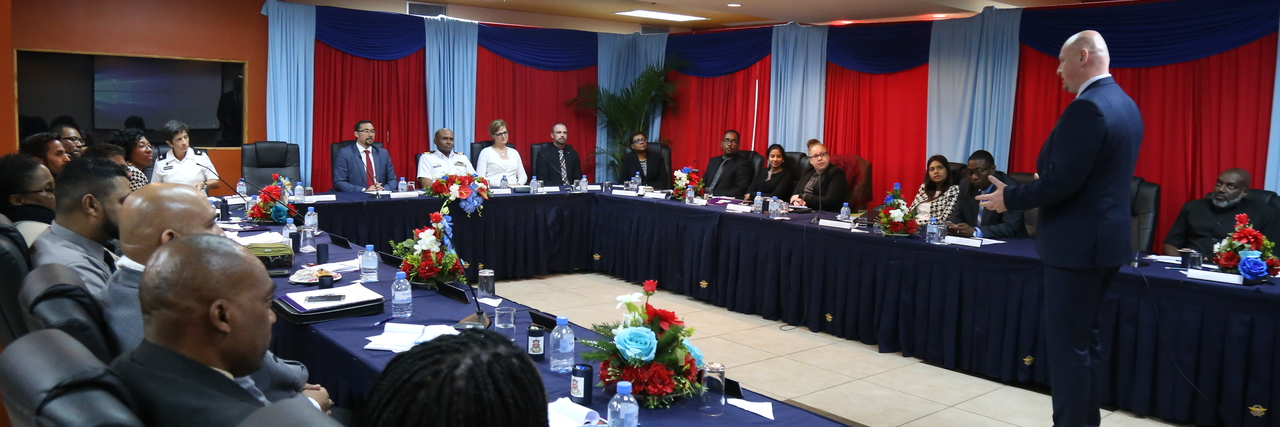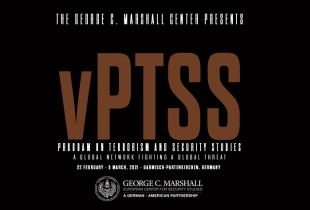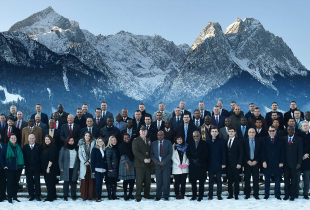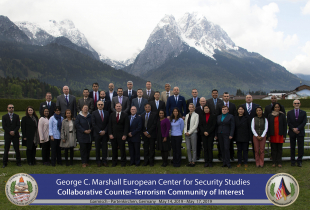
Marshall Center Hosts 1st Caribbean Counterterrorism Workshop
By Nadonya Janca
Alumni Programs
College of International and Security Studies
George C. Marshall European Center for Security Studies
PORT OF SPAIN, Trinidad and Tobago (Feb. 27, 2019) – The George C. Marshall European Center for Security Studies hosted its first workshop in the Caribbean Feb. 12 and 13 here.
“We were here to build a bridge using already existing networks to provide support according to the host nation’s needs,” said Dr. Tibor Kozma, Marshall Center’s professor of Transnational Security Studies, who co-facilitated this workshop. “This two-day-long workshop connected government and non-government actors of Trinidad and Tobago on the same mission, which is to counter young radicalization and focus on solving capability gaps on counterterrorism domain.”
Fully endorsed by the William J. Perry Center, the Counterterrorism Youth Radicalization Workshop focused on creating policy recommendations with regard to youth radicalization and return and reintegration of foreign terrorist fighters and their families.
“Twelve policy recommendations were formulated by the participants,” Kozma said.
“The recommendations address specific subjects in which government and civil society can work more efficiently to prevent, mitigate and manage counter terrorism related risks.”
The event was attended by 22 high-level, whole-of-government representatives including the newly established Nightingale Team, which is a multi-agency team tasked with the repatriation and reintegration of returning foreign fighters and their families.
“Trinidad and Tobago is understandably concerned about returning foreign terrorist fighters, as well as ongoing radicalization and violent extremism,” said Dr. Sam Mullins, Marshall Center’s professor of counterterrorism, who was the other co-facilitator for this workshop.
“The country is taking active steps to strengthen capabilities in counterterrorism, as well as preventing and countering violent extremism,” Mullins added. “Importantly, Trinidad and Tobago is expanding its international cooperation and strengthening collaboration with institutions such as the Marshall Center.”
During the workshop, Trinidad and Tobago officials gave presentations on the history and development of violent extremism in the country, processes of radicalization, as well as current experiences and planning in relation to foreign terrorist fighters. Mullins delivered three presentations on #Terrorist Motivations and Radicalization,” “Preventing and Countering Violent Extremism” and “Returning Foreign Fighters: Challenges and Best Practices.”
The participants apply what they had learned in the context of a tabletop exercise aimed at identifying gaps in their existing procedures and capabilities, and culminating in a set of practical policy recommendations.
Trinidad and Tobago Defense Force Headquarters Chief Defense Staff Rear Adm. Hayden Pritchard hosted the workshop, which was supported by the U.S. Embassy in Trinidad and Tobago.
“The workshop on countering youth radicalization is timely as Trinidad and Tobago has significant work to be done as it relates to the factors that contribute to terrorism, Pritchard said. “Working together with institutions such as the Marshall Center will help expand our view and collaborate on solutions and best practices.”
Once the workshop and alumni event concluded, a closed-door, strategic-level meeting took place chaired by the Trinidad and Tobago Minister of National Security Stuart Young.
The workshop was complimented with a joint Marshall Center and Perry Center Alumni Outreach Networking Event, hosted by the Trinidad and Tobago Attorney General’s office. It was the first collaborative event between the two centers, inviting all alumni to meet for an evening of discussion on counterterrorism security related issues and to continue to grow and expand the network, said Chris Burelli, director of the Marshall Center’s Alumni Programs.
More than 40 alumni discussed collaboration and network expansion during the alumni event. Pritchard opened the event and was followed by Donna Janca, Marshall Center alumni specialist welcoming the alumni and guests from both centers.
Judge Gillian Lucky and retired Trinidad and Tobago army Col. Dave Williams spoke on behalf of the alumni associations of both centers, stressing the importance of continuing communication and building networks within the country and transnationally. U.S. Army Col. Claudia Carrizales, from the U.S. Embassy in Trinidad and Tobago, addressed the importance of strong leadership and participation in programs for growth and development on security related issues. Dr. Kozma ended the event with a presentation on “Leveraging the Global Counterterrorism Network.”


